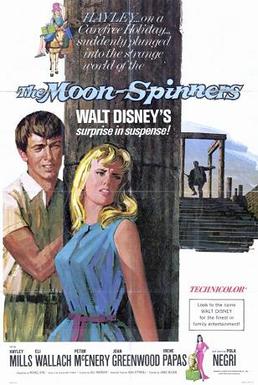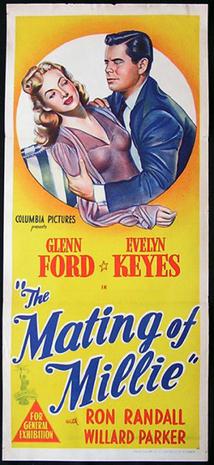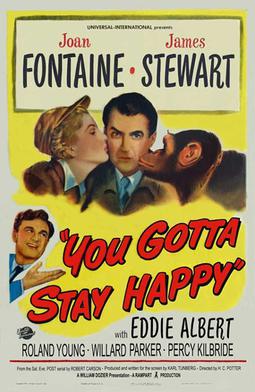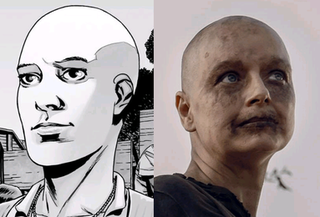Plot
Virginia Radcliff is enrolled at the exclusive Crockett Hall finishing school by her mother, with the acquiescence of her wealthy businessman father. Miss Van Alstyne, the head of the school, informs her new student of Crockett Hall's strict rules of ladylike conduct, but Virginia's new roommate, Cecilia Ferris, soon sets her straight. Van Alstyne and the rest of her staff do not really care what they do as long as it does not become public and stain the reputation of the school.
On the weekend, Cecilia (nicknamed "Pony" for her love of horses) takes Virginia to New York, chaperoned by a fake "Aunt Jessica". They meet Pony's boyfriend and Bill Martin, a conceited college football star, in a hotel room. With her new-found independence, Virginia decides to see what it feels like to get drunk. When she is, an equally-intoxicated Bill tries to take advantage of her. Hotel waiter Ralph "Mac" McFarland rescues her, punching Bill in the face. When he sees how drunk she is, Mac offers to drive her back to school. On the way, she discovers he is a medical intern at a children's hospital. The hospital does not pay him, so he has to work at the hotel to make ends meet.
Miss Van Alstyne is present when Mac drops Virginia off. Van Alstyne rebukes Virginia, not for being out with a handsome young man unchaperoned, but for being seen with him. Their relationship turns frosty. Meanwhile, Virginia sees Mac every chance she can, and they fall in love.
At the Christmas break, Virginia's father is tied up with work, and her mother decides to vacation in Florida, stranding her at school. Pony invites her to spend the holiday at her home, but Van Alstyne decides to punish her rebellious student by keeping her at school. However, Mac shows up secretly, and the couple sneaks away to the boathouse for a romantic evening. The camera pans away as they are kissing, but it is implied that they sleep together (a notion reinforced by Virginia's later actions).
A disapproving Van Alstyne intercepts and secretly tears up loving telegrams from Mac to Virginia, leaving the girl confused and heartbroken. When Van Alstyne insists that Virginia be examined by the school doctor, Virginia becomes first distraught, then defiant about what she and Mac have done. Van Alstyne summons Mrs. Radcliff and notifies her that Virginia is to be expelled. Meanwhile, Pony calls Mac to inform him what is going on. He shows up and takes Virginia away. At the school entrance, they run into Mr. Radcliff. Mac informs him that he and Virginia are going to get married that very day. After checking that his wife is not around, Mr. Radcliff offers his soon-to-be son-in-law a cigar and a congratulatory handshake.

Five Star Final is a 1931 American pre-Code drama film about the excesses of tabloid journalism directed by Mervyn LeRoy and starring Edward G. Robinson, Aline MacMahon and Boris Karloff. The screenplay was by Robert Lord and Byron Morgan based on the 1930 play of the same name by Louis Weitzenkorn. The title refers to the practice of newspapers publishing a series of editions throughout the day, with their final-edition front page having five stars printed and the word "Final." "Five Star Final" is also a font introduced during World War I and then favored by newspapers for its narrow type.

Lady Sings the Blues is a 1972 American biographical musical drama film directed by Sidney J. Furie about jazz singer Billie Holiday, loosely based on her 1956 autobiography that, in turn, took its title from Holiday's song. It is produced by Motown Productions for Paramount Pictures. Diana Ross, in her feature film debut, portrays Holiday, alongside a cast that includes Billy Dee Williams, Richard Pryor, James T. Callahan and Scatman Crothers. The film was nominated for five Academy Awards in 1973, including Best Actress for Diana Ross.

The Moon-Spinners is a 1964 American mystery film starring Hayley Mills, Eli Wallach and Peter McEnery in a story about a jewel thief hiding on the island of Crete. Produced by Walt Disney Productions, the film was loosely based upon a 1962 suspense novel by Mary Stewart and was directed by James Neilson. It featured the legendary silent film actress Pola Negri in her final screen performance.
"Beer" is the fifth episode of the BBC sitcom Blackadder II, the second series of Blackadder, which was set in Elizabethan England from 1558 to 1603. In the episode, an embarrassing incident with a turnip, an ostrich feather and a fanatically Puritan aunt leads to a right royal to-do in the Blackadder household. The episode marks Miriam Margolyes's second and Hugh Laurie's first ever Blackadder appearance with Laurie going on to appear in every subsequent episode of the show.

Eternally Yours is a 1939 American comedy drama film produced and directed by Tay Garnett with Walter Wanger as executive producer, from a screenplay by C. Graham Baker and Gene Towne. The film stars Loretta Young and David Niven, and also features a strong supporting cast including Broderick Crawford, Billie Burke, Eve Arden, ZaSu Pitts, and C. Aubrey Smith. Composer Werner Janssen was nominated for the Academy Award for Best Music.

Good Morning, Miss Dove is a 1955 American CinemaScope drama film that tells the sentimental story of a beloved schoolteacher who reflects back on her life and former students when she is hospitalized. It stars Jennifer Jones, Robert Stack, Kipp Hamilton, Robert Douglas, Peggy Knudsen, Marshall Thompson, Chuck Connors, and Mary Wickes.

Barnacle Bill is a 1941 American comedy drama film starring Wallace Beery. The screen comedy was directed by Richard Thorpe. Barnacle Bill was the second of seven MGM films pairing Beery and character actress Marjorie Main.

Forsaking All Others is a 1934 American romantic comedy-drama film directed by W.S. Van Dyke, and starring Robert Montgomery, Joan Crawford and Clark Gable. The screenplay was written by Joseph L. Mankiewicz, which was based upon a 1933 play by Edward Barry Roberts and Frank Morgan Cavett starring Tallulah Bankhead.

The Mating of Millie is a 1948 American romantic comedy film directed by Henry Levin and starring Glenn Ford, Evelyn Keyes and Ron Randell. It was produced and distributed by Columbia Pictures.

Good-Time Girl is a 1948 British film noir-crime drama film directed by David MacDonald and starring Jean Kent, Dennis Price and Herbert Lom. A homeless girl is asked to explain her bad behaviour in the juvenile court, and says she’s run away from home because she’s unhappy there. They explain in detail what happened to the last girl who thought she could cope on her own, and this becomes the main plot.

Separate Tables is a 1958 American drama film starring Rita Hayworth, Deborah Kerr, David Niven, Burt Lancaster, and Wendy Hiller, based on two one-act plays by Terence Rattigan that were collectively known by this name. Niven and Hiller won Academy Awards for Best Actor and Best Supporting Actress respectively. The picture was directed by Delbert Mann and adapted for the screen by Rattigan, John Gay and an uncredited John Michael Hayes. Mary Grant and Edith Head designed the film's costumes.

You Gotta Stay Happy is a 1948 American romantic comedy film directed by H.C. Potter and starring Joan Fontaine, James Stewart and Eddie Albert. It was distributed by Universal-International and produced by Karl Tunberg. The film was written by Karl Tunberg and Robert Carson and was released on November 4, 1948. The story tells of a marital ruckus that causes pilot Marvin Payne to become enmeshed in the world of New York heiress Miss Diana Dillwood.

"The Gang Gets Racist" is the pilot episode of the American television sitcom It's Always Sunny in Philadelphia. It was written by series creator Rob McElhenney and executive producer Charlie Day, and directed by John Fortenberry. It originally aired on FX on August 4, 2005.

A Dangerous Woman is a 1993 American romantic drama film directed by Stephen Gyllenhaal. The screenplay was written by his wife Naomi Foner, loosely based on the award-winning novel of the same name by Mary McGarry Morris. The feature was co-produced by Amblin Entertainment and Gramercy Pictures. It stars Debra Winger, Barbara Hershey and Gabriel Byrne. It included Gyllenhaal and Foner's two children, Jake and Maggie, who later developed acting careers.

Death in Paradise is a crime novel by Robert B. Parker, the third in his Jesse Stone series. It was made into a film in 2006.
The Witlings is a comedic play written by Frances Burney in 1779. It is a comedy of manners that satirizes literary society. Burney's father believed the play was insulting and persuaded her to bury the play. The Witlings was first acted on stage in the 1990s, over two hundred years after it was written.

Alpha is a fictional character in the comic book series The Walking Dead and the television series of the same name, where she was portrayed by Samantha Morton. In both universes, Alpha is the leader of a group of survivors called the Whisperers, a mysterious group that wears the skins of walkers (zombies) to mask their presence. In the television series, she first appeared in the ninth mid-season premiere.















